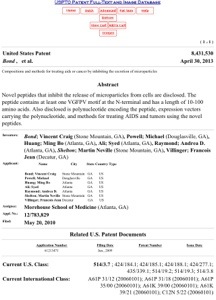ISB Post Doc Gets Patent for Protein that Blocks HIV
 isbscience.org/news/2013/05/02/isb-post-doc-gets-patent-for-protein-that-blocks-hiv/
isbscience.org/news/2013/05/02/isb-post-doc-gets-patent-for-protein-that-blocks-hiv/
Martin Shelton, a post doc in the Lee Hood lab, just received his first patent. He shared the following explanation with his 10-year-old nephew who’s a burgeoning scientist/inventor/engineer.
“We made a small molecule called a peptide (which is a sciency word for a piece of a protein). This peptide blocks a function that is key to the spread of the Human Immunodeficiency Virus (HIV, the virus that causes AIDS) within a person by trapping the virus within the infected cell and preventing it from infecting surrounding cells. It knocks out a similar function in cancer that could hinder tumor growth and the spread of cancer from one part of the body to another. We think it could one day be used to help treat HIV/AIDS or cancer, but it still has a long way to go and would have to pass many, many more tests before it could be used as a medicine. But in the meantime, it’s a useful tool for studying certain aspects of these diseases.”
Congratulations, Martin!






